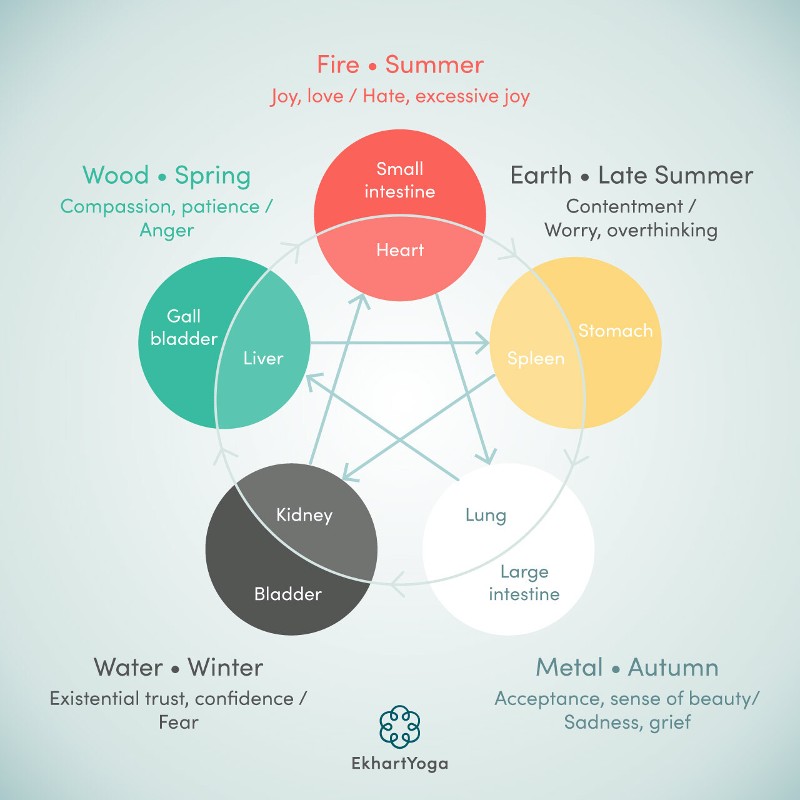The Five element theory from Traditional Chinese Medicine can be used as a framework for understanding patterns in ourselves and in all natural phenomena.
The five energetic elements are Water, Wood, Fire, Earth and Metal. Each element corresponds with different seasons, emotions, biological functions, organs, directions of energy and meridians (energetic channels).
When our energy is flowing freely the five elements are said to be in balance. But imbalances between the elements and their corresponding meridians can cause energy to become blocked or deficient. This can show itself in emotional mental and physical symptoms such as lacking motivation or focus, feeling angry or anxious, digestive problems and tiredness.

Just as with everything in nature the elements are interconnected. Each element supports and gives space to the next in the cycle – this is known as the Feeding cycle (see the outer arrows in the diagram). The elements also keep each other in check so they don’t get out of balance. For example, Water energy acts as a restraining energy against too much Fiery heat in Summer (the inner crossing arrows in the diagram).
How can Yin Yoga practices work with 5 Element Theory?
The meridians are each connected with pairs of organs. Yin yoga postures stimulate specific meridians so they can help to identify and work on these blockages or imbalances.
| Element | Season | Meridian | Emotions |
| Wood | Spring | Gall-bladder / liver | Compassion, patience / Anger |
| Fire | Summer | Small intestine / heart | Joy, love / Hate, excessive joy |
| Earth | Late Summer | Stomach / spleen | Contentment / Worry, over-thinking |
| Metal | Autumn/Fall | Lung / large intestine | Acceptance, Sadness, grief |
| Water | Winter | Kidney / bladder | Trust, confidence / Fear |
For more details on meridian theory read Masha’s article: Introduction to Meridian Theory and Yin Yoga
By using this holistic framework of the 5 Elements and Yin Yoga meridian theory, we may begin to recognise patterns where we have blocks in our energy, and use supportive self-care practices such as Yin Yoga to bring us back into balance.
We invite you to join us for our new 5 week Yin Yoga program with José de Groot designed to nourish your whole mind and body.
With José’s gentle guidance, this program will help you:
- nurture yourself emotionally, mentally and physically
- maintain a more relaxed and compassionate state of being
- digest food, emotions and thoughts
- improve your focus and motivation
- feel more grounded, connected and spacious
- cultivate your deep knowing that everything and everybody is connected
- understand the importance of creating time for yourself
Join us for Yin Yoga and the 5 Elements – a 5 week guided program
Over the course of 5 weeks, José will guide you through an in-depth practice each week which will focus on a different element and corresponding meridian. You’ll practice Yin yoga poses and other techniques, such as massaging acupressure points, to stimulate and nourish the meridians associated with each element to improve emotional well-being and relieve tension throughout the body.
While the program is not designed to replace medical advice, it is a useful way to look more holistically at different areas of our lives – giving ourselves a Yin yoga check-up! – and bringing in practices that support our whole body systems.
This program is available to all EkhartYoga members. Not a member yet? Register for your two-week free trial to take part.


